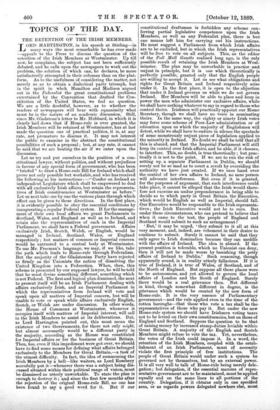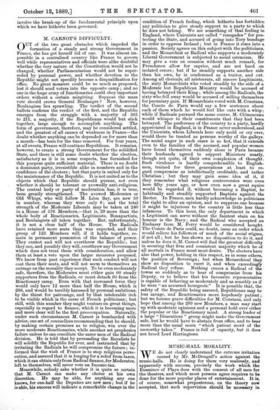TOPICS OF THE DAY.
THE RETENTION OF THE IRISH MEMBERS. 1-ORD HA RTINGTON, in his speech at Stirling- , in many ways the most remarkable he has ever made —appeals to the Press to discuss the question of the retention of the Irish Members at Westminster. Up till now, he complains, the subject has not been sufficiently debated, and he calls upon the newspapers to work out the problem, the solution of which can, he declares, be more satisfactorily attempted in their columns than on the plat- form. As to the usefulness of considering the matter, not merely so as to obtain a dialectical party triumph, but in the spirit in whch Hamilton and Madison argued out in the Federalist the great constitutional problems entertained by the Convention that drafted the Con- stitution of the United States, we feel no question. We are a little doubtful, however, as to whether the readers of newspapers will bear with equanimity what must be in the nature of an academic discussion. Still, since Mr. Gladstone's letter to Mr. Hubbard, in which it is clearly laid down that if Home-rule is ever granted, the Irish Members will be retained at Westminster, has at last made the question one of practical politics, it is, at any rate, not premature to discuss it. It may not interest the public to examine in the abstract the constitutional possibilities of such a proposal ; but, at any rate, it cannot be said that we are beating the air if we enter upon the discussion.
Let us try and put ourselves in the position of a con- stitutional lawyer, without politics, and without prejudices in favour of any special form of government, who has been " briefed " to draw a Home-rule Bill for Ireland which shall prove not only possible but workable, and who has received the following as his instructions :—" Confer on Ireland. an independent Legislature which shall be empowered to deal with all exclusively Irish affairs, but retain the representa- tives of Irish constituencies at Westminster as before." Let us next take one by one the various plans through which effect can be given to these directions. In the first place, it is evidently possible to obey the essential conditions by inaugurating a regular Federal system. If for the manage- ment of their own local affairs we grant Parliaments to Scotland, Wales, and England as well as to Ireland, and retain also the representatives of each in the Imperial Parliament, we shall have a Federal government. Affairs exclusively Irish, Scotch, Welsh, or English, would be managed in Ireland, Scotland, Wales, or England respectively ; but matters of common or Imperial concern would be entrusted to a central body at Westminster. To use Mr. Freeman's language, we may, if we like, take the path which leads to Home-rule through Federalism. But the majority of the Gladstonian Party have rejected as firmly as the Unionists the notion of dissolving the United Kingdom into a Federation. When, then, this scheme is presented by our supposed lawyer, he will be told that he must devise something different, something which is not Federal. The first and logical plan dismissed, the next to present itself will be an Irish Parliament dealing with affairs exclusively Irish, and an Imperial Parliament in which the representatives from Ireland will vote and speak upon all matters of Imperial concern, but will be unable to vote or speak while affairs exclusively English, Scotch, or Welsh are under discussion. In other words, the House of Commons at Westminster, whenever it occupies itself with matters of Imperial interest, will call in the Irish Members to assist at its deliberations. But, as Lord Hartington pointed out, this must mean the existence of two Governments, for there not only might, but almost necessarily would be a different party in the majority, according as the House was constituted for Imperial affairs or for the business of Great Britain. Then, too, even if this impediment were got over, we should have to find some means for defining what affairs belonged exclusively to the Members for Great Britain,—a task of the utmost difficulty. In fact, the idea of summoning the Irish Members by a bell—like waiters, as Lord Rosebery scornfully put it--whenever there was a subject being dis- cussed. situated within their political range of vision, must be dismissed as utterly unworkable. To state the plan is enough to destroy it ; and since the first few months after the rejection of the original Home-rule Bill, no one has been found tea sa7 a good word for it. But if our constitutional draftsman is forbidden any scheme con- ferring partial legislative competence upon the Irish Members, as well as any Federalist plan, there is but one means left him for carrying out his instructions. He must suggest a Parliament from which Irish affairs are to be excluded, but in which the Irish representatives will be free to vote on all subjects. This, as the editor of the Pall Mall Gazette realised long ago, is the only. possible result of retaining the Irish Members at West- minster. The plan may be unworkable in practice and unjust in principle, but it is one which theoretically is perfectly possible, granted only that the English people are willing to accept it. Let us see what obligations and rights for Great Britain and Ireland respectively arise under it. In the first place, it is open to the obiectian, that under it Ireland governs us while we do not govern Ireland. Her Members will be able to place and keep in power the men who administer our exclusive affairs, while we shall have nothing whatever to say in regard to those who- control theirs. Irishmen will practically appoint our Home Secretary, though we shall have no voice in nominating theirs. In the same way, the eighty or ninety Irish votes may force some scheme of Poor-Law administration or of education upon us which the majority of Englishmen will detest, while we shall have to endure in silence the spectacle of some monstrously unj ust piece of legislation applied to the minority in Ireland. No doubt we shall be told that all this is absurd, and that the Imperial Parliament will still keep its control over Irish affairs, and be able, if it chooses, to interfere. This, no doubt, is true thoretically ; but prac- tically it is not to the point. If we are to run the risk of setting up a separate Parliament in Dublin, we should surely not be so mad as to court a revolt by overriding the authority we have just created. If we once hand over the control of her own affairs to Ireland, no sane person will advocate interference. But even if it is granted, for the purposes of argument, that such interference could take place, it cannot be alleged that the Irish would there- fore not exercise an undue preponderance in being able to decide as ta which party in Great Britain the Executive, which would be English as well as Imperial, should fall, Our Executive would be responsible to the Irish representa- tives; the Irish Executive would not be to ours. But under these circumstances, who can pretend to believe that when it came to the test, the people of England and Scotland would submit to such an arrangement?
But,' it may be urged, they submit to it all at this very moment, and, indeed, are vehement in their desire to continue to submit. Surely it cannot be said that they only agree to Irish domination because they can meddle with the affairs of Ireland. The idea is absurd. If the present position is tolerable, which no Unionist can deny, then it will not be made worse by banishing the petty affairs of Ireland to Dublin.' Such reasoning, though apparently sound, is in reality utterly fallacious. If it is true of Ireland, it is true of Wales, of Scotland, and of the North of England. But suppose all these places were to be autonomous, and yet allowed to govern the local affairs of London and. the South of England. Surely there would. be a real grievance then. Not different in kind, though somewhat different in degree, is the grievance which would be created by the new form of Home-rule. It is the very essence of Parliamentary government—and the rule applied even in the time of the rotten boroughs—that those who vote a tax shall be the representatives of those who pay it. But under the new Home-rule system we should have Irishmen voting taxes not to be levied on their own constituencies, but on those of England and Scotland. Suppose the question to be that of raising money by increased stamp-duties leviable within Great Britain. A majority of the English and Scotch Members might refuse to vote the tax. Yet, nevertheless, the votes of the Irish could impose it. In a word, the retention of the Irish Members, coupled with the estab- lishment of an Irish Parliament, must of necessity violate the first principle . of free institutions. The people of Great Britain would under such a system be governed not by themselves, but by an external power. It is all very well to talk of Home-rule being merely dele- gation; but delegation, if the essential maxims of repre- sentative government are to be maintained, must be applied equally and on the same lines to all portions of the country. Delegation, if it obtains only in one specified area, or as regards powers delegated. nowhere else, must involve the break-up of the fundamental principle upon which we have hitherto been governed.



















































 Previous page
Previous page